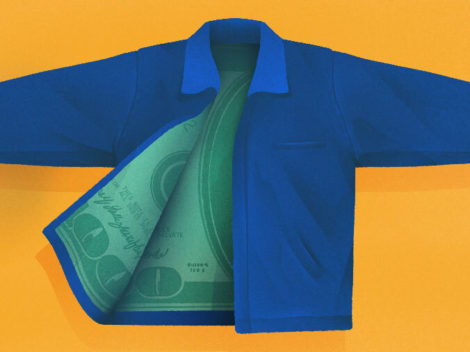The COVID-19 pandemic has no doubt kept people at home. And with people at home and looking for hobbies, crafting has seen a boom that’s prompted action in the public markets.
Subscribe to the Crunchbase Daily
Retail during the COVID-19 pandemic has been a story of “heaven or hell,” according to Paula Rosenblum, co-founder and managing partner at retail advisory firm RSR Research. While some retailers have been hit hard by the pandemic, others like sporting goods stores and crafting stores have rallied because of the increased demand for pandemic-safe activities.
“The pandemic drove business up for hobbies, not down, because everybody’s stuck in the house,” Rosenblum said in an interview. “So the crafting industry became a big deal.”
Jo-Ann Stores, a retailer specializing in crafts and fabrics, and crafting machine-maker Cricut both filed for an IPO on the same day in February, with Jo-Ann expected to begin trading on the public markets later this week. Not long after the companies filed for an IPO, publicly traded arts and crafts retailer Michaels announced that it is being acquired by private-equity firm Apollo Global Management in a $5 billion deal.
Companies file to go public because they’re growing and want access to the capital that public markets provide, while a company like Michaels might file to go private because “an investor believes they can pull expenses out and make it more profitable and bring it public again,” Rosenblum said.
Indeed, the growth of companies like Jo-Ann and Cricut is clear, and neither is secretive that the pandemic and the trends accelerated by it gave their businesses a boost.
In its S-1 registration document filed with the Securities and Exchange Commission, Jo-Ann wrote, “Broader Creative Product sales have accelerated meaningfully as customers spend more time doing DIY activities at home, have an increased desire to learn new skills and take on projects, and engage in personal protective equipment-making activities for personal use, to sell or to share with the community.”
The company noted that while it’s difficult to estimate the exact amount of sales that were the result of people making personal protective equipment, the company noticed changes in usual sales trends that support PPE making, such as greater sales in cotton fabric and certain sewing supplies.
Jo-Ann in particular was able to ride the “mask boom,” according to Sucharita Kodali, a vice president and principal analyst focusing on retail at Forrester Research. Especially in the early days of the pandemic when there were personal protective equipment shortages and mask mandates were beginning to be instituted, many people sewed their own masks, either for themselves, or to gift or sell.
“(Jo-Ann) had a pretty rocky last few years. It really did seemingly get a lifeline in the pandemic for sure,” Kodali said.
Timing
Jo-Ann was a publicly traded company before being taken private in 2011 by private-equity firm Leonard Green & Partners. Its CEO resigned in 2014, and another CEO resigned in 2018 to join JCPenney. Now, Jo-Ann appears to be positioning itself more like a tech company as it goes public again, emphasizing its e-commerce and digital capabilities.
“What’s really interesting is the timing of Michaels because if you look at Jo-Ann and Michaels as comparable, that would not speak well to Jo-Ann,” Kodali said.
Michaels being taken private now isn’t a good look for Jo-Ann, as both are known as crafting stores.
“When it’s a public company and it’s being taken off the market, that usually means that it’s not usually doing that well,” Kodali said. “If you’re at the height of your valuation as a public company, nobody buys you. It’s rare. It usually happens because somebody thinks there’s something that needs to be changed, or management needs an overhaul.”
Michaels’ stock has gone up over the past year, from $3.59 per share on March 9, 2020, to closing at $21.95 on March 9, 2021.
“It could also mean that there’s wishful thinking going on,” Kodali said. “But it’s rarely a public company being taken off the market because it’s a hot commodity. This is not an eligible bachelor being taken off the market, it’s usually a signal that something’s wrong.”
Timing is likely also a big factor prompting Jo-Ann and Cricut to go public now: The IPO market is hot and public markets have been enthusiastic about new companies. Special purpose acquisition companies, or SPACs, have also been on a tear.
For Jo-Ann, at least, it could be a case of now or never. According to Rosenblum, crafting and party supplies is a challenging industry during “normal times” because it’s “a lot of cheap stuff,” which makes keeping track of inventory difficult.
Although the business has invested in its e-commerce capabilities, “it’s not like there’s some great new technology here, it’s mostly e-commerce,” Kodali said. “They sell fabric stuff, which has been around for a long time. And it’s mostly feeding the artisan market because most people get their clothes from factories in China anyway … If it was ever going to go public it would have to be at a time like this when there’s this crazy burst in demand they’ve never seen before and will probably never see again.”
Illustration: Dom Guzman

Stay up to date with recent funding rounds, acquisitions, and more with the Crunchbase Daily.


![Computer generating AI data. [Dom Guzman]](https://news.crunchbase.com/wp-content/uploads/AI-generated-470x352.jpg)
![Illustration of agentive AI brain - Global - Quarterly. [Dom Guzman]](https://news.crunchbase.com/wp-content/uploads/Agentive_AI_global-470x352.jpg)

![Illustration of a guy watering plants with a blocked hose - Global [Dom Guzman]](https://news.crunchbase.com/wp-content/uploads/quarterly-global-3-300x168.jpg)
67.1K Followers